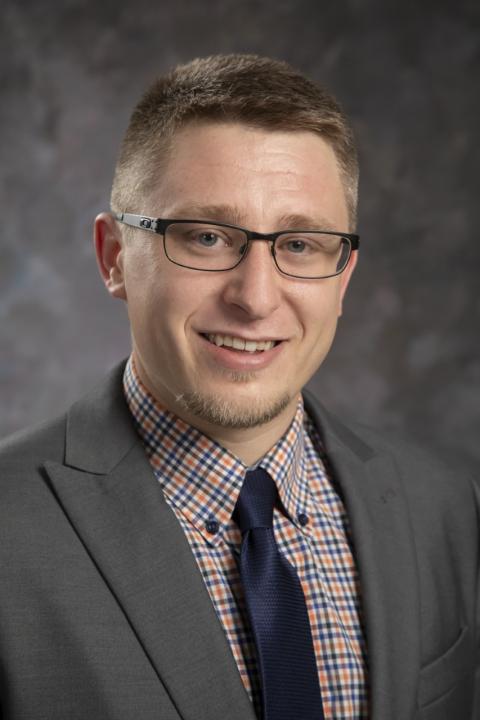
Kevin Genestreti
Senior Research Scientist Earth Oceans and Space, Science and Engineering Division, Southwest Research Institute
Education:
Ph.D., Physics, University of Texas San Antonio, 2016
B.S., Physics: Astronomy, Honors in physics, University of New Hampshire, 2012
Research interests:
· Magnetosphere – Solar Wind Coupling; Earth’s magnetosphere carves out a protective bubble around the planet, shielding us from most of the plasma that’s emitted by the sun in the solar wind. When solar wind energy enters our magnetospheric bubble there can be wide-ranging consequences for space weather. Under the right conditions, the solar wind can drive brilliant aurorae in our upper atmosphere and increase harmful radiation levels in regions of space that host GPS, telecommunications, and other satellites. I study the coupling of the magnetosphere and solar wind to understand the fundamental physical processes that power space weather.
· Magnetotail physics; The magnetotail is the “battery” region of the magnetosphere; it stores energy from the solar wind and releases it, often violently, powering the most explosive phenomena in space weather: geomagnetic storms and substorms. When it’s active, the magnetotail accelerates plasma that’s trapped by Earth’s magnetosphere and expels it toward Earth and also out of the magnetosphere entirely. I study Earth’s magnetotail to understand the physical processes that rapidly redistribute mass and energy throughout our magnetospheric bubble.
· Magnetic Reconnection; Reconnection is a universal process, in that it occurs in plasmas in the solar atmosphere, in Earth’s magnetosphere, in other planets’ magnetospheres, beyond the solar system, and in laboratories on Earth. Reconnection dissipates magnetic fields and accelerates particles. It is the principal mechanism that allows solar wind energy to penetrate the magnetosphere. Reconnection is also the process that “charges” and “short circuits” the “battery” region of our magnetosphere: the magnetotail. I study magnetic reconnection to understand one of the most important processes for driving explosive phenomena in our magnetospheric bubble and in plasmas throughout the universe.
About me:
Dr. Genestreti has over 10 years of experience in the analysis and calibration of in situ plasma measurements, specializing in applications of electrostatic analyzers. Dr. Genestreti has worked with data from space missions such as Cluster, Geotail, Magnetospheric Multi-scale (MMS), Van Allen Probes (VAP), etc. He is currently a co-investigator and deputy principle investigator in training for NASA’s flagship MMS mission. He has contributed to instrumentation efforts such as Cluster-CODIF, MMS-HPCA, MMS- FPI, VAP-HOPE, etc. Dr. Genestreti has published research on topics such as magnetic reconnection in space plasmas, substorms on Earth and Mercury, thermal structures in the Earth’s plasmasphere, etc. Currently, Dr. Genestreti’s research focuses on micro-scale processes during magnetic reconnection using MMS particle and fields data, supported by the analysis of particle-in-cell simulations.
As an undergraduate at UNH, Dr. Genestreti studied heavy ion dynamics during magnetopause reconnection and performed in-flight calibration of the Cluster-CODIF analyzer. He obtained his Ph.D. from the joint UTSA-SwRI graduate program in space physics. At UTSA/SwRI, Dr. Genestreti helped calibrate MMS-HPCA and helped cross-calibrate MMS-HPCA with MMS-FPI. Dr. Genestreti researched magnetic reconnection in the Earth’s magnetotail and developed analysis tools to evaluate temperatures of low-energy plasmas. Dr. Genestreti continued his research on magnetic reconnection as a postdoc at the Space Research Institute at the Austrian Academy of Sciences, as a Research Scientist at UNH, and as a Research Scientist and Senior Research Scientist at SwRI (2019-present).
Professional Chronology:
University of New Hampshire Earth, Oceans, and Space (UNH-EOS) Department: undergraduate research assistant, 2009-12;
University of Texas at San Antonio: graduate research assistant (at SwRI), 2012-16;
Austrian Academy of Sciences Space Research Institute: postdoctoral researcher, 2016-18;
University of New Hampshire Earth, Oceans, and Space (UNH-EOS) Department: research scientist III, 2018-2019;
Southwest Research Institute: Research Scientist, 2019-2020;
Southwest Research Institute: Senior Scientist 2020-present.
Publications:
To see an up-to-date list of my publications, please find me on Google Scholar or ResearchGate.